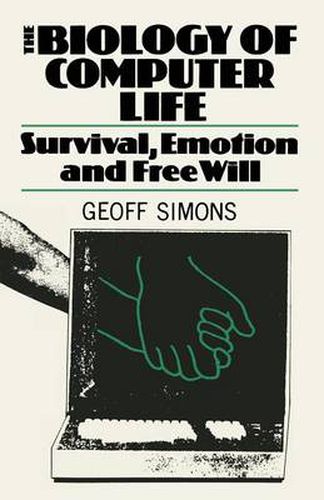Readings Newsletter
Become a Readings Member to make your shopping experience even easier.
Sign in or sign up for free!
You’re not far away from qualifying for FREE standard shipping within Australia
You’ve qualified for FREE standard shipping within Australia
The cart is loading…






This title is printed to order. This book may have been self-published. If so, we cannot guarantee the quality of the content. In the main most books will have gone through the editing process however some may not. We therefore suggest that you be aware of this before ordering this book. If in doubt check either the author or publisher’s details as we are unable to accept any returns unless they are faulty. Please contact us if you have any questions.
The doctrine of computer life is not congenial to many people. Often they have not thought in any depth about the idea, and it necessarily disturbs their psychological and intellectual frame of reference: it forces a reappraisal of what it is to be alive, what it is to be human, and whether there are profound, yet un expected, implications in the development of modern com puters. There is abundant evidence to suggest that we are wit nessing the emergence of a vast new family of life-forms on earth, organisms that are not based on the familiar metabolic chemistries yet whose manifest ‘life credentials’ are accumulating year by year. It is a mistake to regard biology as a closed science, with arbitrarily limited categories; and we should agree with Jacob (1974) who observed that ‘Contrary to what is imagined, biology is not a unified science’. Biology is essentially concerned with living things, and we should be reluctant to assume that at anyone time our concept and understanding of life are complete and incapable of further refinement. And it seems clear that much of the continuing refinement of biological categories will be stimulated by advances in systems theory, and in particular by those advances that relate to the rapidly expanding world of computing and robotics. We should also remember what Pant in (1968) said in a different context: ‘the biological sciences are unrestricted … and their investigator must be prepared to follow their problems into any other science whatsoever.
$9.00 standard shipping within Australia
FREE standard shipping within Australia for orders over $100.00
Express & International shipping calculated at checkout
This title is printed to order. This book may have been self-published. If so, we cannot guarantee the quality of the content. In the main most books will have gone through the editing process however some may not. We therefore suggest that you be aware of this before ordering this book. If in doubt check either the author or publisher’s details as we are unable to accept any returns unless they are faulty. Please contact us if you have any questions.
The doctrine of computer life is not congenial to many people. Often they have not thought in any depth about the idea, and it necessarily disturbs their psychological and intellectual frame of reference: it forces a reappraisal of what it is to be alive, what it is to be human, and whether there are profound, yet un expected, implications in the development of modern com puters. There is abundant evidence to suggest that we are wit nessing the emergence of a vast new family of life-forms on earth, organisms that are not based on the familiar metabolic chemistries yet whose manifest ‘life credentials’ are accumulating year by year. It is a mistake to regard biology as a closed science, with arbitrarily limited categories; and we should agree with Jacob (1974) who observed that ‘Contrary to what is imagined, biology is not a unified science’. Biology is essentially concerned with living things, and we should be reluctant to assume that at anyone time our concept and understanding of life are complete and incapable of further refinement. And it seems clear that much of the continuing refinement of biological categories will be stimulated by advances in systems theory, and in particular by those advances that relate to the rapidly expanding world of computing and robotics. We should also remember what Pant in (1968) said in a different context: ‘the biological sciences are unrestricted … and their investigator must be prepared to follow their problems into any other science whatsoever.